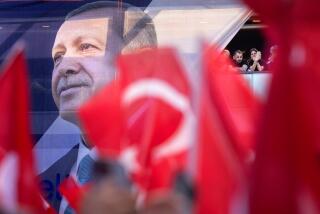Turkey Lends Hand in Fight Against Rebels
- Share via
ANKARA, Turkey — Newspapers reported recently that Turkish Interior Minister Saadettin Tantan has been reading up on the Taliban, Afghanistan’s militant Islamic movement. Is he trying to figure out how to fight Islamic militants in his own nation?
No. Tantan has Uzbekistan in mind. He was there last month, offering Turkish expertise to counter Islamic rebels in the former Soviet republic.
Since then, Turkish President Ahmet Necdet Sezer has signed military cooperation agreements with Uzbekistan and neighboring Kyrgyzstan during state visits to the Central Asian nations.
Turkey is quietly reviving its interest in the former Soviet republics of Central Asia--a vast, predominantly Muslim region with which it shares ethnic, cultural and linguistic ties--to help protect authoritarian, secular leaders there against Islamist challengers.
Eager to weaken Moscow’s influence over Soviet-era dominions and check advances by Islamic militants from Iran and Afghanistan, Turkey launched diplomatic and commercial overtures in the region after the Soviet Union collapsed in 1991. The Turks got vocal support from the United States, which is trying to draw the Central Asian states closer to the West.
But by the mid-1990s, Turkey’s interest in the region had waned, and officials acknowledge that the nation’s plans were overly ambitious and ill-conceived. After years of negotiations, for example, pipelines to bring Central Asia’s abundant oil and natural gas through Turkish ports to Western markets remain on the drawing board.
U.S. and Turkish officials downplay the importance of Turkey’s budding military role in the region, saying it is merely symbolic. Critics say it helps the authoritarian regimes crush unarmed dissent as well as guerrillas.
Under the recent agreements, Turkish officers will help train fledgling Uzbek and Kyrgyz armies at home and in Turkey. With quiet encouragement from Washington, the Turks dispatched two planeloads of light weaponry and ammunition to Uzbekistan for guards patrolling its 80-mile border with Afghanistan. Turkish military and intelligence advisors are soon to follow.
Islamic rebels have stepped up attacks against Kyrgz and Uzbek forces in recent months and have targeted Western tourists. The insurgents are widely believed to receive arms, cash and religious indoctrination from the Taliban, which controls more than 95% of Afghanistan, including the country’s borders with Uzbekistan and Turkmenistan.
For Islam Karimov, the Soviet-era Communist leader who still rules Uzbekistan, Turkey’s overtures could not have been more timely. He has been staving off Russia’s offers of troops and other military assistance because they would increase his government’s dependence on Moscow.
Yet until the recent state visit, Karimov had been accusing Turkey of supporting his Islamist opponents, some of whom tried to kill him in February. Turkey did, in fact, give sanctuary to one of Karimov’s leading critics, Salih Mohammed, an intellectual who has rallied behind the Islamist opposition while disavowing violence.
Shortly after the attempt on his life, Karimov ordered hundreds of Uzbek students to return home from schools in Turkey, saying they were being brainwashed by Islamic militants there. At home, he shut down several Turkish schools run by a Muslim brotherhood. Thousands of Uzbeks accused of ties to the rebels have been jailed and hundreds have been executed, according to Western human rights groups.
Karimov’s decision to accept the military aid came after Turkey, a Muslim nation with a secular government, ordered Mohammed to leave the country.
Critics of Turkish aid say it will help a repressive leader stay in power.
“Does the Turkish model in Central Asia consist of bolstering someone like Karimov, who applies state terror?” asked Ibrahim Karagul, a foreign affairs commentator for the pro-Islamic Turkish newspaper Yeni Safak. “If so, Turkey will only gain the hatred of the local people.”
(BEGIN TEXT OF INFOBOX / INFOGRAPHIC)
Alliances in Central Asia
Turkish President Ahmet Necdet Sezer has signed military cooperation agreements with Uzbekistan and Kyrgyzstan, both former Soviet republics, to help protect secular leaders there against Islamist challengers. Under the pacts, Turkish officers will help train the nations’ armies.
More to Read
Sign up for Essential California
The most important California stories and recommendations in your inbox every morning.
You may occasionally receive promotional content from the Los Angeles Times.













